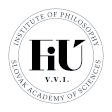Personal Profile
PhD study topics for the academic year 2024/2025
The Neo-Pyrrhonian skeptical tradition and its representatives in the second half of the 20th centuryAnnotation:The PhD student will work on the contribution of the most important figure of this tradition, the German philosopher Odo Marquard. The thesis will focus on Marquard’s continuation of the tradition of Pyrrhic skepticism and its further development when applied to modern conditions, on the notion of a philosophy of history, and on the concept of ethics (morality) and anthropology (habitualism, anthropology, homo compensator). On this basis, he attempts to confront his own attitudes to the questions posed by modern neo-Pyrrhonist skepticism: what shapes us; what we can influence; how we understand the political rules that govern society; whether we have the possibility of interpreting them in yet another way; how we move in constant conflict with multiplicity and unity, etc. |
Kant’s treatise “On Perpetual Peace” and contemporary political philosophyAnnotation:The starting point of this thesis is a critical analysis of the philosophical and political context of Kant’s treatise “Towards Perpetual Peace.” The graduate will explain the relationship between Kant’s political thought and transcendental philosophy, without the understanding of which the analysis of the concepts of Kant’s political philosophy is impossible. Thus, the author will focus on some of the main problems of Kant’s philosophy, which are hidden behind the terms freedom, law, the idea of law, the state, the state system, constitutionalism, liberalism, republicanism, cosmopolitanism, etc. The thesis will show how these main concepts of the philosophy of politics are formally and substantively defined by Kant himself and will compare Kant’s understanding of them with their understanding in contemporary political contexts, in particular the European Union. |
Concept of phenomenological anthropology in Hans Blumenberg’s workAnnotation:The student will work through the main works of Hans Blumenberg with a focus on his methodology of historical and phenomenological anthropology. The student will explain how this method conditioned Blumenberg’s conception of modernity, myth, and metaphor. |
Democracy adjourned: uncertainty as a characteristic of society in an environmental crisisAnnotation:The student will elaborate a problem analysis of the concept of political democracy in the epoch of the Anthropocene with reference to the tradition of critical theory of society and the theory of post-democracy, aversive democracy, simulation democracy and other ways of addressing the problem of democracy. |

 0000-0002-6610-246X
0000-0002-6610-246X